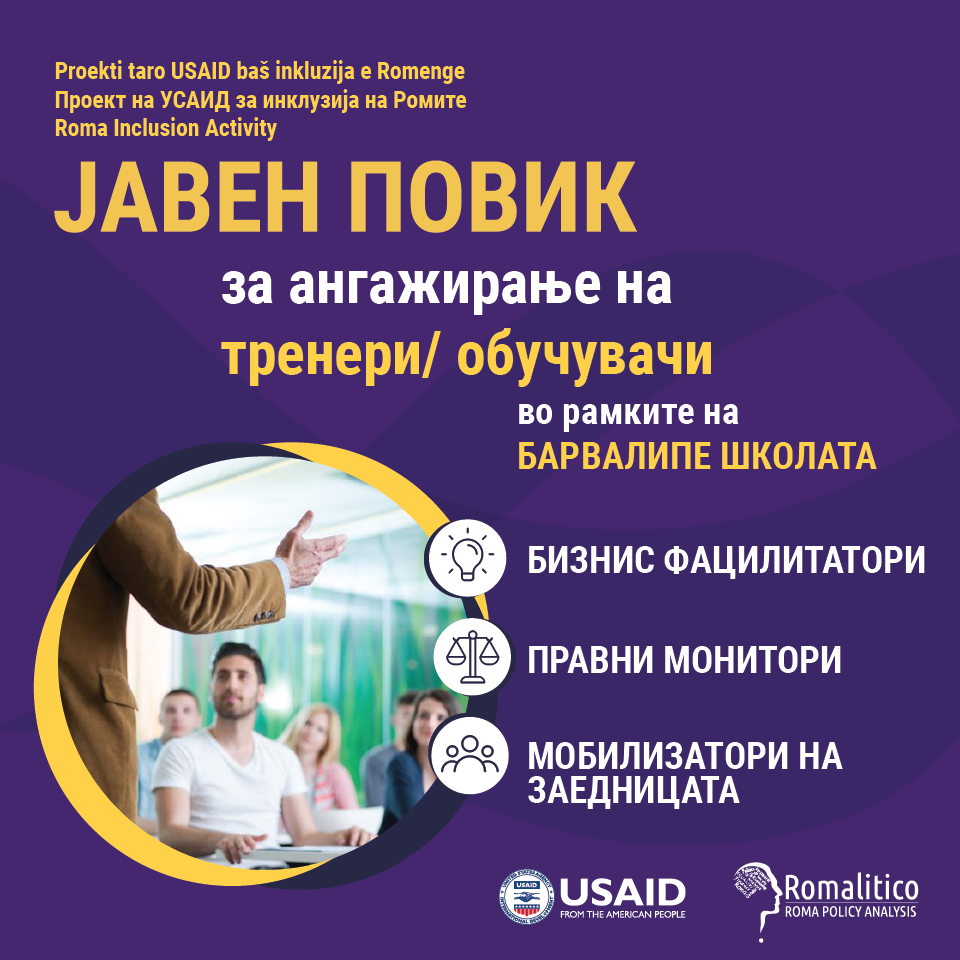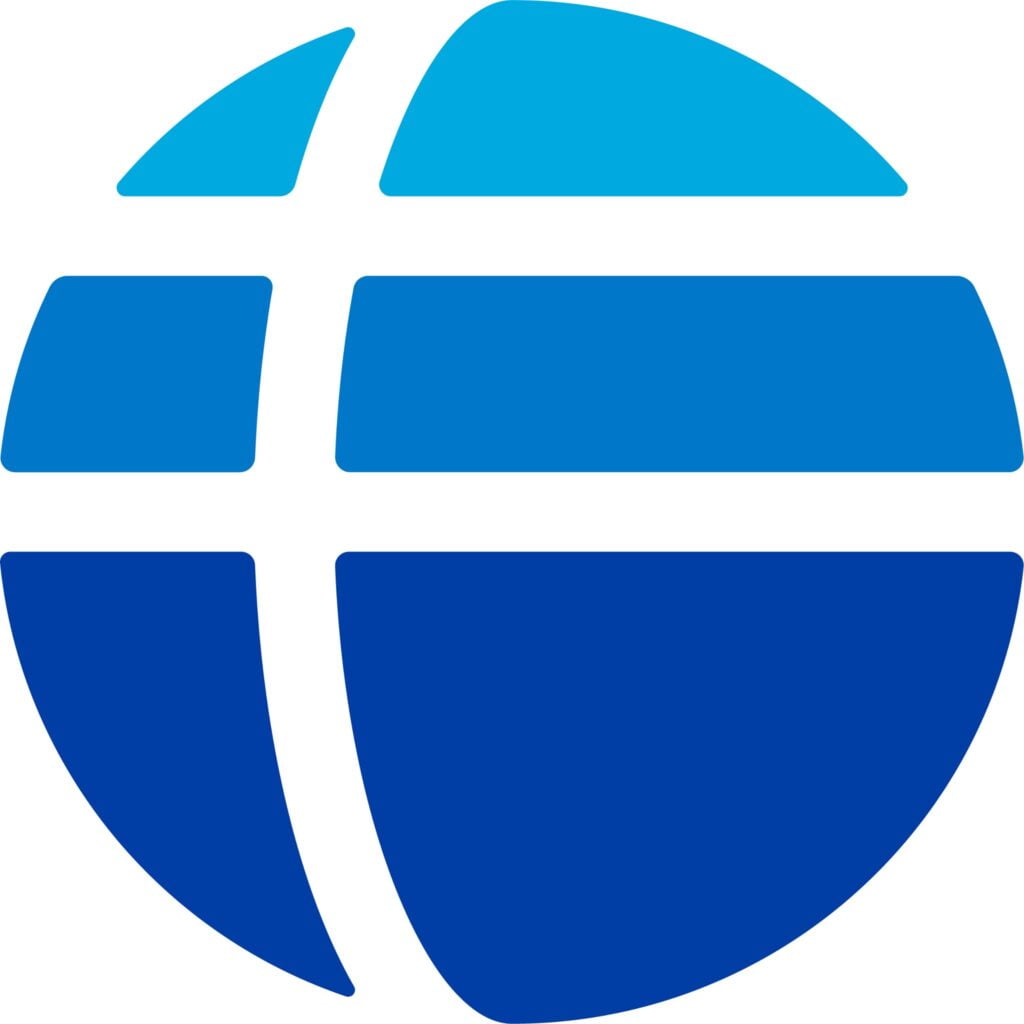Датум на објава: 10 Мaј 2021
Краен рок за аплицирање: 20 Мај 2021 (16:00 часот)
Институтот за истражување и анализи на политики – Ромалитико во рамките на проектот насловен: Проект на УСАИД за инклузија на Ромите, финансиран од УСАИД – Македонија кој се спроведува во партнерство со организациите ЗГ „Иницијатива за Економски Развој на Ромите- РЕДИ“, Организација за јакнење и организирање на ромската заедница “Романо Авази” и Здружение на граѓани “Ромаверзитас” објавува Јавен повик за ангажирање на тренери/ обучувачи за теренски соработници во рамките на Барвалипе школата за лидерство.
Целта на проектот е да го зголеми капацитетот на ромските лидери во заедницата како и да овозможи нивно вклучување во Националната стратегија за имплементација на Роми, Стратегијата едно општество и вклучување во процесот на дизајнирање на локални акциони планови за Роми. Исто така со овој проект се предвидува процес на развој предводен од заедницата во дваесет општини каде ќе се стават во функција канцеларии/ хабови при што теренските соработници ќе даваат услуги и информации поврзани со правна, социјална заштита, поддршка во процесот за пристап до одредени права, претприемништво, мерки и услуги од институциите, како и застапување на потребите на Ромската заедница на локално ниво.
1. Опис
Во рамките на проектот, предвидено е да се ангажираат Тренери/ обучувачи за спроведување на серија на обуки (модули) за теренски соработници според дефинираните профили: Бизнис Фасцилитатор, Правен Монитор и Мобилизатор на заедницата.
Барвалипе школата за лидерство е предвидено да се спроведе во периодот Мај-Јуни 2021 и ќе биде организирана низ серија на обуки, кои опфаќаат модули од различни теми кои ќе бидат организирани на комбиниран начин – он-лајн преку платформата ZOOM и со физичко присуство во зависност од состојбата со КОВИД19. Секоја обука е планирана да трае по два работни дена и избраниот обучувач ќе има вкупно ангажман од четири работни дена по обука, односно еден ипол ден за подготовка на обуката, два дена за спроведување и половина ден за известување и оценка на практичната задача од секој модул.
Во рамките на Школата за лидерство се предвидуваат обуки од четири модули од по 2 дена кои треба да се тематски организирани за секој профил на теренските соработници и тоа:
- Обуки за Бизнис Фасцилитатор
- Обуки за Правен Монитор
- Обуки за Мобилизатор на заедницата
2. Работни задачи
Специфични задачи кои обучувачите треба да ги реализираат во склоп на консултантскиот договор се следниве:
- Подготовка на целокупна програма за тематската област за која аплицираат;
- Организирање на консултативни средби со претставници од Ромалитико и партнерските организации за финализирање на програмата на обуката;
- Подготовка на дизајн на сесија според образец даден во прилог
- Подготовка на материјали и вежби за учесниците на обуките;
- Имплементација на четири Модули засебно за секој профил (4 Модули за Бизнис фасцилитатор, 4 Модули за правен монитор, 4 Модули за Мобилизатор на заедницата) со учество на минимум 20 учесници на обуката;
- Подготовка на евалуација и извештај по завршување на обуката
- Подготовка на практични задачи од секој Модул и оценка на задачите
3. Потребни квалификации и критериуми за избор
Тренерите/ обучувачите треба да имаат:
ü 5 годишно искуство во спроведување на обуки за теренски соработници поврзани со учество, застапување, креирање на политики, претприемништво, активни мерки за вработување, организирање на заедница, правна заштита;
- Можност за работа преку електронска платформа;
- Познавање на Ромските прашања и граѓанскиот сектор;
- Можност да работи самостојно, со минимална потреба од супервизија;
- Да користи алатки за неформално образование;
- Да поседува вештини за тимска работа;
- Релевантно образование во областа за која аплицира ќе се смета за предност.
Тренерите/ обучувачите потребно да го познаваат и локалниот контекст на Ромите – невработеност и претприемништво, правна заштита и дискриминацијата, проблеми и потреби на заедницата на локално ниво, како и да поседуваат информации за постоечките документи и стратегии на национално ниво кои ги опфаќаат овие области. Право да аплицираат имаат физички и правни лица кои имаат претходно искуство во спроведување на обуки.
4. Документи за пријавување
Заинтересираните кандидати треба да ги достават следните документи:
- Професионална биографија CV (физички лица)/ портфолио на спроведени обуки и извештај од централен регистар (правни лица);
- Листа на испорачани работилници/обуки за темата/ите за кои се пријавувате;
- Предлог дизајн за Модулите за кои се пријавувате како обучувач; (превземи темплејт со кликнување на следниотлинк)
- Финансиска понуда (превземи темплејт со кликнување на следниотлинк)
Потребните документи се доставуваат на [email protected], со назнака „Апликација за тренер за Барвалипе школа“, најдоцна до 20.05.2021 година, до 16.00 часот. Пријавите пристигнати по рокот нема да бидат земени во предвид. Дополнително доколку имате одредени прашања поврзани со повикот може да ги доставите до Проектниот директор – Елвис Шаќири на следниот емаил [email protected] или на 075/314-504.
Институтот за истражување и анализа на политики – Ромалитико ќе ги евалуира доставените понуди врз основа на квалитет на различни елементи на пристигнатите апликации, релевантното искуство вклучувајќи го и предложениот буџет и ќе одлучи за најсоодветниот кандидат.




